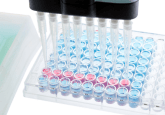Could the future hold a blood-based test for Alzheimer’s disease?

Lipidomic approach identifies potential biomarker panel for preclinical Alzheimer’s disease.
In a recent publication in Nature Medicine, a group of researchers have presented a prospective study that has identified ten potential lipid biomarkers for the development of Alzheimer’s disease. This preliminary study involved 525 people, with future work planned to verify these initial findings.
The study involved assessing cognitive and memory skills in the 525 participants – all aged over 70 years – once a year for 5 years. Alongside these tests, blood samples were taken. The team then carried out MS analysis on these samples, comparing ‘cognitively healthy’ individuals to those who developed signs of Alzheimer’s disease. They found ten phospholipids that were consistently at lower levels in those who developed the disease; and report validation on these findings – citing an accuracy rate of 90% to detect preclinical Alzheimer’s disease within a 2–3 year timeframe.
In their paper, the researchers explain that there are currently no cures or therapies for Alzheimer’s disease, and attribute this in part to our current inability to diagnose the condition before evident memory loss has occurred. They therefore envisage their findings having implications both in instigating interventions earlier in disease progression, and also in recruiting patients to clinical trials to allow more effective clinical research for this condition.
Source: Mapstone M, Cheema AK, Fiandaca MS et al. Plasma phospholipids identify antecedent memory impairment in older adults. Nat. Med. DOI:10.1038/nm.3466 (2014) (Epub ahead of print).





